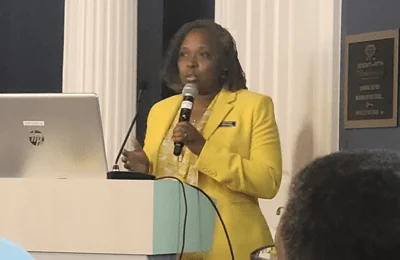CTA's DEI czar Denise Barreto and a CTA train. | Evanston Present and Future; Wikimedia Commons / JeremyA
CTA's DEI czar Denise Barreto and a CTA train. | Evanston Present and Future; Wikimedia Commons / JeremyA
GOP activist William Mueller and other Cook County residents are pushing back against Diversity, Equity, and Inclusion initiatives, noting the hyper-politicization of such policies.
“Diversity, Equity yada yada is designed to destroy merit and create a victim class,” Mueller told West Cook News.
“This will destroy excellence and industriousness in society and along with destruction of the family, will eventually destroy society.”
Mueller's remarks followed an interview featuring Denise Barreto, the Chief Equity Officer for the Chicago Transit Authority (CTA), on WBBM. Barreto, appointed to her position in July, has played a pivotal role in advancing equity initiatives in Cook County.
Reflecting on her career trajectory in DEI roles, Barreto noted, "I wasn't trying to be in equity, but corporate America didn't know how to harness this energy.”
During the WBBM interview, Barreto, who had been elected twice as a trustee for Lake in the Hills, expressed that McHenry County "wasn't very friendly to people that look like me," citing her race as a factor. Subsequently, she relocated to Evanston. In her previous role as the Director of Equity and Inclusion for Cook County, Barreto played a pivotal role in initiating a 2021 mandate for "racial equity and cultural competency training" for all county employees by 2022.
Under Barreto's leadership, Cook County allocated $100 million to its Equity Fund, with a substantial portion directed towards businesses owned by minorities and women.
In 2019 alone, the county reported expenditures of $74 million with such contractors, including $25 million with Black-owned businesses, $18 million with Hispanic-owned businesses, $15 million with Asian-owned businesses, and $14 million with women-owned businesses.
Barreto emphasized the significance of redirecting funds to minorities.
“Money we would be spending, we’re spending on folks who need it most, connecting them to our systems. The idea is, that gives them a chance to be seen by other entities. Because that’s half the battle with minority businesses — people giving you a chance. You can’t do racial equity without betting on somebody you don’t know,” Barreto told the Chicago Sun-Times.
DEI initiatives have come under scrutiny following the recent United States Supreme Court ruling in Students for Fair Admissions v. Harvard, which opposed affirmative action programs solely based on racial identity.
Described as a "landmark vindication of constitutional colorblindness" by Josh Hammer in Chronicles, the ruling has prompted a series of challenges to DEI initiatives.
Notably, a coalition of 13 Republican state attorneys general sent a letter to Fortune 100 CEOs, reminding them of their legal obligations against racial discrimination in the workplace.
In parallel, U.S. Sen. Tom Cotton (R-Ark.) has cautioned major law firms about the legal consequences associated with race-based employment practices, indicating a broader movement to scrutinize DEI programs nationwide.
“The upshot could not be clearer: Following the legal triumph of genuine human ‘equality’ and the defeat of vogue leftist notions of ‘equity’ in SFFA, DEI apparatuses nationwide should tread extremely carefully,” Hammer wrote for Chronicles.
“Better yet, leading state attorneys general and members of Congress will be watching corporate diversitycrats like a hawk, threatening to sue, investigate or subpoena them if they stray too far and engage in race-conscious hiring, firing or other personnel decisions. Considering that the entire raison d’etre of the DEI regime is to do precisely this, the Republican attorneys general and members of Congress should find themselves with an overabundance of possible legal targets.”
The Heritage Foundation reports the ineffectiveness of DEI programs has been increasingly evident, with critics questioning the value of such initiatives, especially after the recent Supreme Court ruling against race-based affirmative action.
Despite the high-profile support for DEI from figures like Ibram X. Kendi and Robin DiAngelo, both earning substantial fees for their engagements, mounting research suggests that professional development and training in DEI are largely ineffective.
Calls are growing to reconsider public funding for DEI offices, with recommendations to protect individuals from compelled adherence to certain ideologies that may violate civil rights principles.
“Such ideas would include the notion that individuals today are automatically guilty of racial crimes committed by others decades ago who happen to share the color of their skin,” Jonathan Butcher wrote for the Heritage Foundation.
“In public colleges and universities, lawmakers should prohibit school officials from using DEI statements to screen job applicants. Similar prohibitions on compelled speech should also apply.”






 Alerts Sign-up
Alerts Sign-up